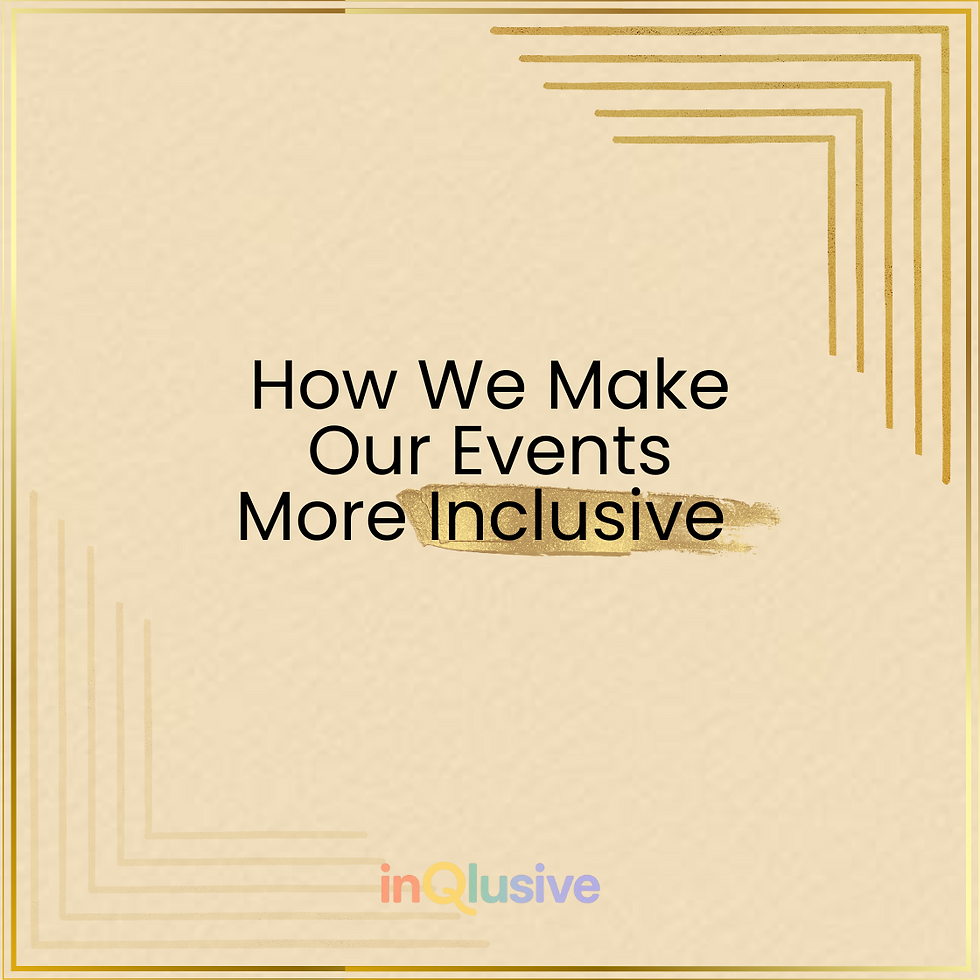How We Make Our Events More Inclusive
- inQlusive

- May 27, 2025
- 2 min read
We’re committed to making our events welcoming for all queer and neurodivergent folks by prioritizing accessibility, safety, and comfort. Check out the slides to see how we ensure everyone feels at home! What makes a space feel inclusive to you? Let us know in the comments.
Queer & Neurodivergent Inclusion
We clearly outline event details — We include location, time, schedule, and what to expect.
We allow different levels of participation — There’s no pressure to talk or engage beyond comfort.
We have stim-friendly items (fidget toys, textured objects, etc.).
We encourage sensory-friendly alternatives — We allow sunglasses, noise-canceling headphones, movement breaks, etc.
We allow alternative communication (writing, texting, or using speech apps for those who prefer them).
We make entry/exit easy — There’s no pressure to stay the whole time.
We use name tags with pronouns, and gender-neutral language.
We have a zero-tolerance policy for discrimination.
We provide resources — We share info about queer and ND-friendly mental health support, crisis lines, etc.
Social & Emotional Inclusion
We greet new attendees warmly and celebrate each person‘s presence.
We use icebreakers that aren’t stressful. They’re optional, fun, and not overly personal.
We validate different social styles — It’s okay to be quiet, energetic, or anywhere in between.
We let people engage in their own way — Standing aside, participating in side conversations, or observing are all accepted.
We encourage consent culture for physical touch, and photos.
We offer virtual events for those who can’t attend in person.
We check in with quieter members without ever pushing them to talk.
Event Inclusion & Space Design
We will do our best to pick accessible venues, ensuring wheelchair access and minimal barriers as much as possible.
We provide transportation details (bus routes, parking, and carpool options).
We offer multiple seating options whenever possible (chairs, couches, standing spaces, floor seating, etc.).
We offer a variety of activities for all energy/interaction levels.
We offer food/drinks that meet different dietary needs — Vegan, gluten-free, allergy-friendly options.
We make expectations clear — There’s no pressure to participate in every activity.
We use visual indicators for interaction levels, like color-coded bracelets or stickers (e.g., green for “I’m open to chatting,” red for “I need space.”).
We have a conflict resolution plan — In case issues arise, we know how to handle them respectfully.
Community & Long-Term Inclusion
We rotate event types — Some quiet, some social, some in-person, some virtual, etc.
We celebrate diverse holidays & awareness days.
We offer financial accessibility — Hosting free or pay-what-you-can events when possible.
We promote community connections & encourage friendships outside of events.
We regularly update our inclusivity guidelines to make sure our policies evolve with the group’s needs.
We encourage feedback & regularly ask for input to adjust as needed.
We celebrate member milestones — We shout out birthdays, transition anniversaries, or personal achievements (with consent).
We prioritize mental health support — We have check-in events, share mental health resources, and cultivate a community culture that encourages rest and self-care.


Comments